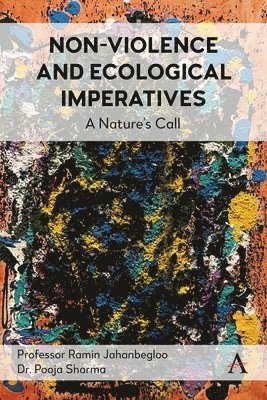Kommande

Vetenskap & teknik
Non-Violence and Ecological Imperatives
Ramin Jahanbegloo • Pooja Sharma
Inbunden
1569:-
Violence impregnates human life in many ways. We do violence to individuals or groups. We do violence to plants and animals. We do violence to the planet Earth. However, Nature will not survive our arrogance and patterns of exploiting and destroying the biosphere if we do not break the cycle of violence. As such, any moral effort to stop barbaric consumerism and chaotic nihilism is simultaneously the possibility of making life and biodiversity flourish on Earth. The moral imperative is thus also an ecological imperative. Therefore, the question is: how can we talk about non-violence in the current ecological crisis? Put differently, we can also ask: how can non-violence be brought to our ecological concerns? Martin Luther King, Jr. once said, 'Injustice anywhere is a threat to justice everywhere'. The notion of injustice becomes all the more crucial when applied to excluding animals and plants from the history of our planet. This eco-moral crisis must become more public as the ecological trajectory of the Earth foreshadows a very troublesome future. Non-violence and Ecological Imperative is a contribution to the relevance and potential of the philosophy of non-violence in showing clearly that our viable ecological future depends on attitudes and strategies that are rooted in the Gandhian moment of civilising humanity as an antidote to the violent modern techno-industrial way of life. The interdependence and cooperation between humans and nature are inevitable. Non-exploitative and non-violent prerequisites of Gandhian ideology entail that interdependence and cooperation must be based on altruistic values and not on self-interest and materialistic values. This signifies immeasurable love not only among humans but also with nature. Thus, absolute love substitutes greed. Non-possession from an absolute love revolutionises the socio-ecological paradigm of human civilisation. Various ecological scientists and economists have asserted the need for revisiting the harmony between human activities and nature. Stern et.al (1998) concluded that economic growth would never result in improvement in environmental quality. Arrow et.al (1995) concluded that economic growth is not a panacea for environmental quality. Meadows et al. (1972) in his book The Limits to Growth claimed that environmental limits would cause the collapse of the world economic system. Against this backdrop, Gandhi advocated the process of recycling and minimising waste so that humans adopt a lifestyle that integrates with the ecosystem. Humans must dwell in a life that converges with the law of nature and maintains ecological harmony. This notion of continuity of life is inspired by the Gandhian philosophy of non-violence and absolute love. The moment there is a break in continuity, it results in violence leading to unrest or conflict, dismantling the process of continuity.
- Format: Inbunden
- ISBN: 9781839993305
- Språk: Engelska
- Utgivningsdatum: 2025-08-05
- Förlag: Anthem Press

